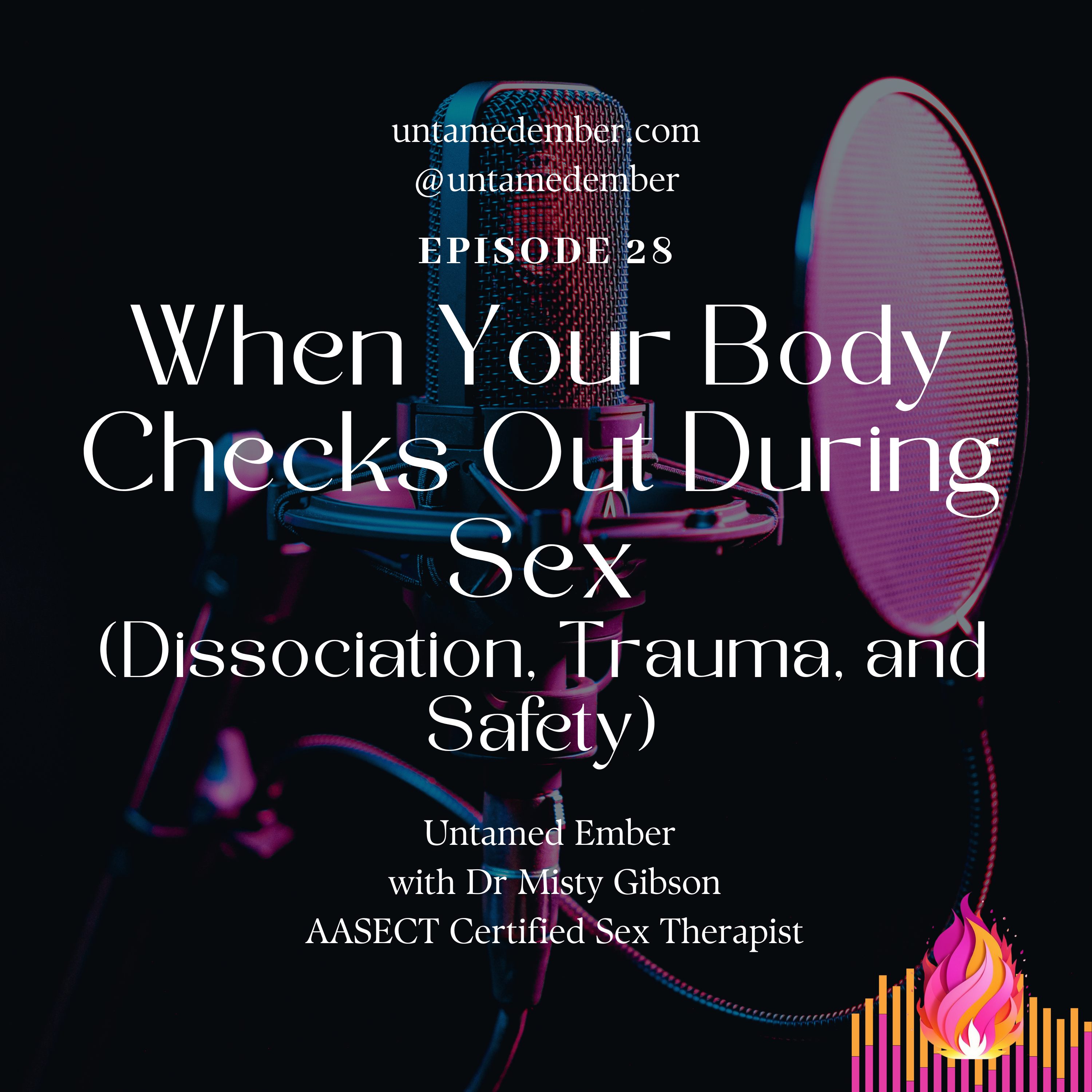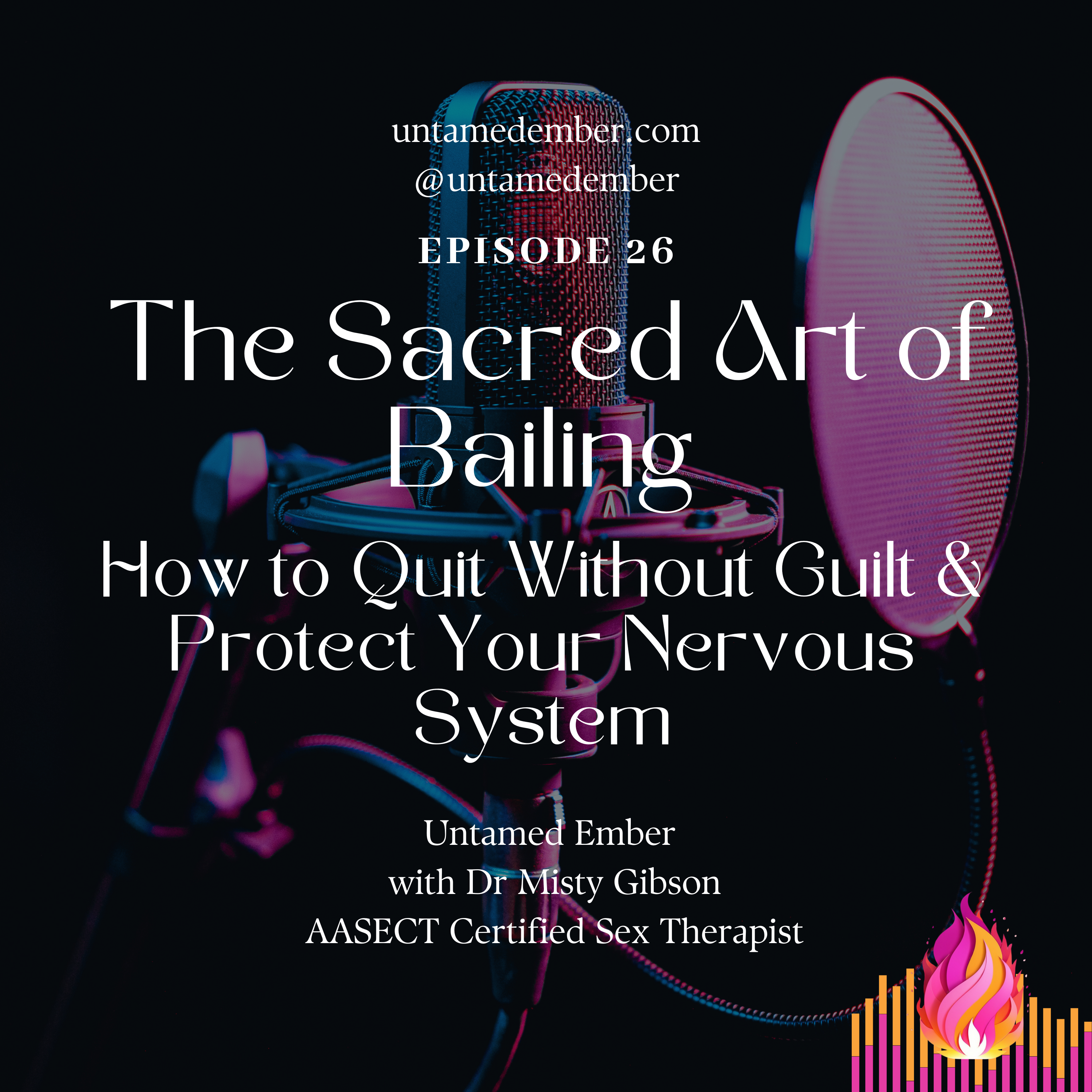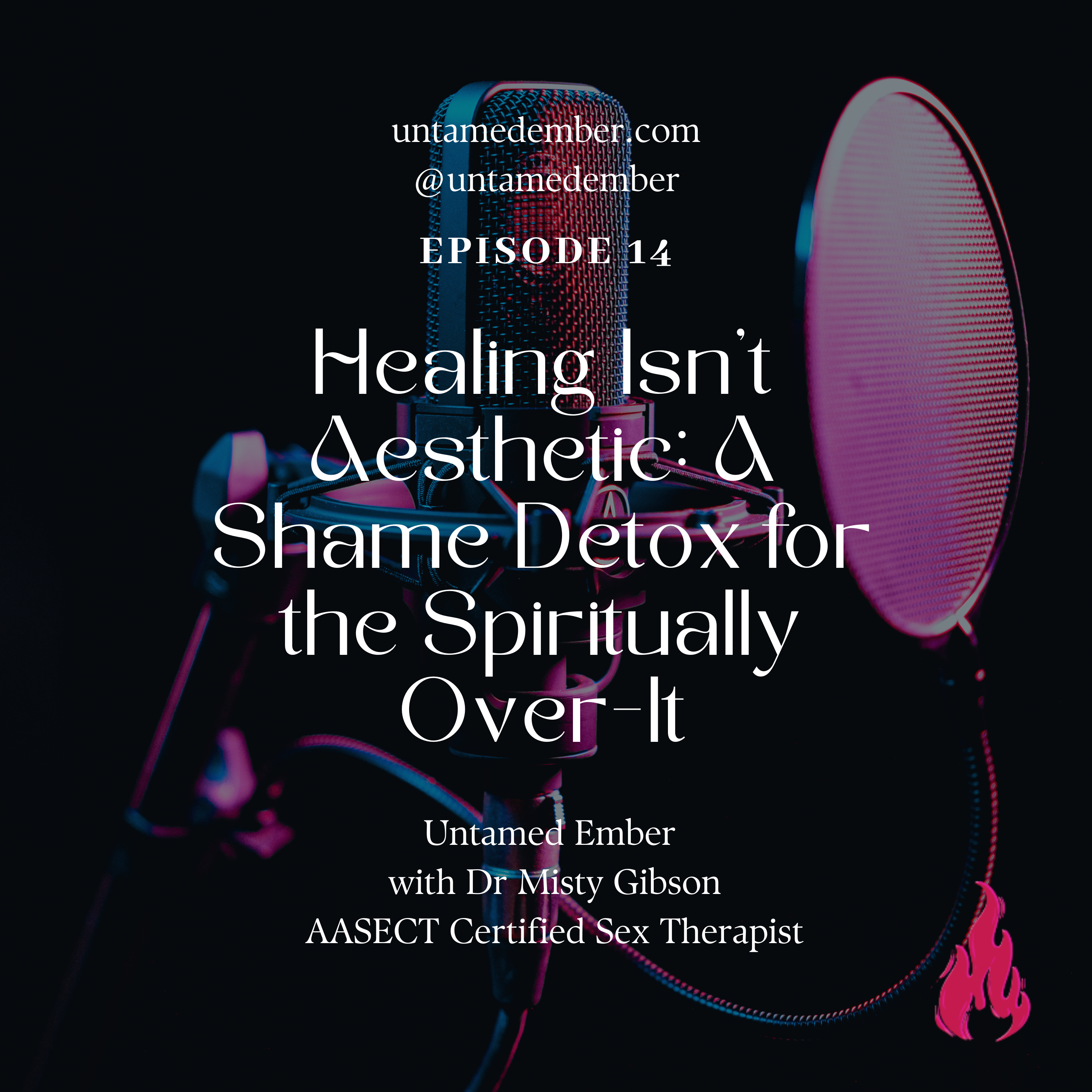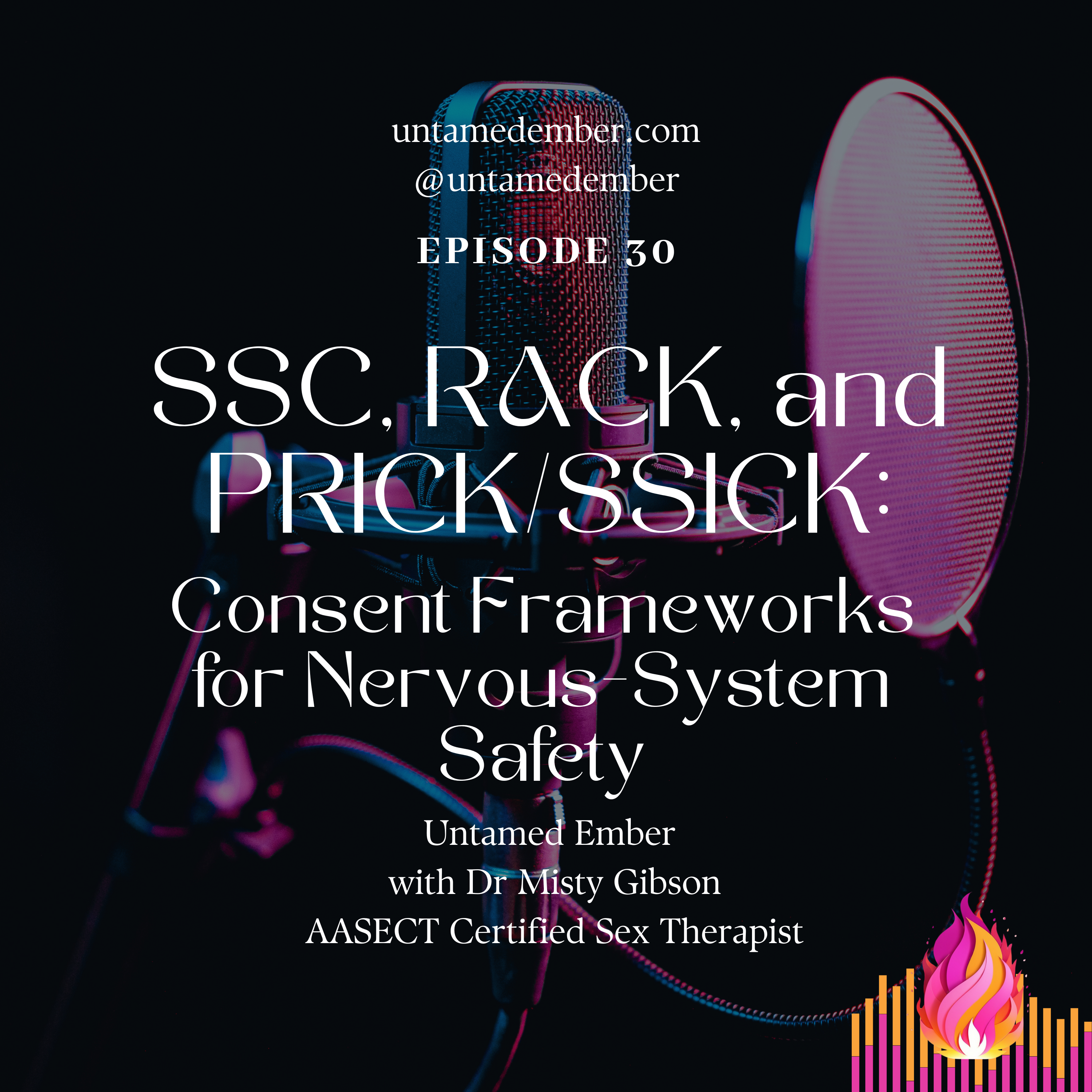Episode Transcript
[00:00:00] There's a moment that no one talks about when physical intimacy becomes an out of body experience.
[00:00:06] Not in the transcendent way we see in movies, but in the way where you suddenly realize you're watching yourself from a distance. Your partner is touching you, but you can't feel it. Or you can feel it, but it's like it's happening to someone else. Maybe your mind goes blank or maybe it races to the most mundane thoughts. Did I lock the front door? What time is that meeting tomorrow? This is what dissociation during sex actually looks like. And if you've been there, floating outside of yourself when you desperately wanted to stay present. I need you to know something. Your body isn't betraying you. It's protecting you. The only way it knows how. Today on Untamed Ember, we're going to talk about what really happens when your nervous system hits the eject button during intimacy.
[00:00:54] We're going to explore why checking out doesn't mean you're broken. And why it can happen even in the safest relationships. And most importantly, how to gently find your way back to your body and to genuine pleasure. On your terms and in your time. I'm your host, Dr. Misty, and studies suggest that up to 70% of people have experienced some form of dissociation during sex at least once. You are not alone in this, even though it might feel like you are sometimes. Let's start by getting real clear about what dissociation actually is. I want you to think of it as your nervous system's safety override button. When things feel too intense, too vulnerable or too overwhelming, your body has this incredible protective mechanism that essentially says, okay, we're checking out for a bit. From a nervous system perspective, this is your body shifting into what we call dorsal vagal shutdown. I've talked about that before. It's part of your polyvagal response system. Basically your body's way of managing threat and safety. When arousal, intimacy or vulnerability feels like too much to handle, your nervous system makes an executive decision to protect you by creating distance between you and the experience.
[00:02:12] And I need you to hear this. You're not broken. Your body is doing exactly what it was designed to do.
[00:02:19] It's protecting you in the only way it knows how. Think of it this way. Your nervous system is basically the bouncer at the club of your body.
[00:02:27] If things feel sketchy, it'll throw. Even if you were actually into the song that is playing, it doesn't stop to ask questions or check your logical brain's opinion. It just Acts to keep you safe. Now, dissociation exists on a spectrum. Maybe for you it's a subtle numbing, like the volume on your sensations get turned way down.
[00:02:50] Maybe it's more like watching yourself from outside of your body. That classic out of body experience.
[00:02:56] Maybe your mind goes completely blank, like a computer screen in sleep mode. Or maybe you find yourself thinking about the most random things. Your to do list, what you're making for dinner, that weird conversation you had three years ago.
[00:03:10] All of these are forms of dissociation. All of them are your nervous system saying, this is too much right now, so we're creating some distance.
[00:03:19] And all of them are completely valid protective responses.
[00:03:23] So why does this happen during sex specifically? Well, sex is one of the most vulnerable experiences that we can have. We're literally and figuratively exposed.
[00:03:34] And for many of us, there are layers upon layers of experiences that can make intimacy feel unsafe to our bodies.
[00:03:43] Maybe you have a trauma history. And I want to be clear, Trauma doesn't always mean what people think it is. Yes, it can be big t trauma, like assault or abuse, but it can also be little t trauma. Being shamed for masturbating as a kid, having your boundaries repeatedly crossed, being told your body was dangerous or dirty, having a partner criticize your body or your responses.
[00:04:06] All of these experiences accumulate in your body's memory bank.
[00:04:10] Maybe you grew up in purity culture where sex was wrapped in shame and fear, where you were taught that your value was tied to your virginity, that desire was dangerous, that good girls don't want it and bad girls don't deserve respect.
[00:04:25] These messages don't just evaporate when we decide we're ready for sex. They live in our bodies.
[00:04:32] Maybe you carry religious conditioning that taught you your body and desires were sinful.
[00:04:38] The fascinating and heartbreaking thing about this is that your nervous system doesn't have a wedding ring detector. It doesn't suddenly flip a switch and say, oh, we're married now, so sex is holy and good.
[00:04:51] If you spent years learning that sexual feelings were shameful, your body remembers that even when your circumstances change.
[00:04:59] Maybe you feel performance pressure, this idea that you need to be sexy enough, responsive enough, good enough. Social media, porn movies, they've all given us these scripts about what sex should look like. And when we're busy performing, trying to look right, sound right, respond right, we're not actually present in our bodies. We're up in our heads directing the show. And here's what I really want you to understand. Dissociation can happen even with loving, consensual partners, even when everything is right on paper. This isn't about logic in your brain, it's about safety in your I hear this all the time. Someone will tell me. But I knew I was safe. My partner was kind, patient, gentle, and still. I disappeared. That gap between knowing you're safe and actually feeling safe in your body, that's where dissociation lives. Your logical brain might be saying, this is good, this is safe. But your body is operating from a different playbook, one written by every experience you've ever had.
[00:06:01] Sometimes it's not even about the present moment at all. Your partner might touch you in a certain way, or you might catch a certain scent or find yourself in a certain position, and suddenly your body is responding to something from the past.
[00:06:15] Not because you're consciously thinking about it, but because your body holds memory in ways your conscious mind doesn't always access.
[00:06:22] And for my neurodivergent listeners, there's another layer here. Maybe it's sensory overwhelm. Too much touch, too much stimulation. Too many sensations at once. The feeling of skin on skin, the sounds, the smells, the temperature changes. For a sensitive nervous system, it can be like trying to have sex inside a pinball machine.
[00:06:43] Maybe it's the ADHD brain doing its hyper focus swing, where suddenly you're thinking about your grocery list instead of what's happening. Or that thing where you become hyper aware of one random detail. The pat on the sheets, a sound outside, the way the light is hitting the wall and you can't pull your attention back.
[00:07:03] Maybe it's autistic sensory defensiveness, where certain touches or positions feel wrong in ways you can't articulate. Like your skin is suddenly made of static, or certain pressures feel like too much and not enough all at the same time. Maybe it's the exhaustion of masking all day and now your body just doesn't have any presence left to give.
[00:07:26] You've spent so much energy appearing neurotypical, reading social cues, managing sensory input, that when it comes time to be intimate, your tank is empty. There's nothing left for presence. Now let's talk about what happens after. Because dissociation rarely travels alone, it usually brings its buddy Shame along for the ride. You check back in, realize what happened, and immediately the inner critic starts up. I'm frigid. I'm too sensitive. There's something wrong with me. My partner's going to think I'm not attracted to them. I'm broken. Why can't I just be normal? And here's where it gets really sticky. That shame actually dysregulates your nervous system even more. Which means the next time that you're intimate, your body is even more likely to shut down. It becomes this cycle. Dissociation leads to shame. Shame leads to more nervous system dysregulation, which leads to more likelihood of dissociation. Round and round we go. But listen, shame is not proof that you're broken. It's proof the system worked exactly as designed. It shut down to keep you safe. Your body did its job. The relational impact can be really challenging too. Sometimes partners misinterpret dissociation as rejection. You're not into me. Sometimes we perform even harder to hide what's happening, which just adds another layer of disconnection. We fake orgasms, we make the right sounds, we go through the motions, all while feeling like we're watching a movie of ourselves.
[00:09:00] Sometimes partners get frustrated, especially if they don't understand what's happening. They might take it personally, think they're doing something wrong, or worse, pressure you to just relax or stay with me. As if you're choosing to check out. As if you wouldn't stay present if you could.
[00:09:17] Neither of these responses actually helps. What we need is a completely new script for how we handle this. So how do we begin to work with this? I'm not going to give you a five step plan to fix dissociation, because this isn't about fixing. It's about gently, compassionately expanding your capacity for presence and pleasure. First, let's talk about micro check ins.
[00:09:38] During intimacy, you can pause and ask yourself, am I still here? Just that simple question.
[00:09:45] Not with judgment, just with curiosity. If the answer is no, that's information, not a failure.
[00:09:51] You can also do a quick body scan. Can I feel my hands? My feet? My breath?
[00:09:56] Sometimes just wiggling your toes or squeezing your partner's hand can help you come back into your body.
[00:10:02] These aren't grand gestures. They're tiny invitations back to presence.
[00:10:07] Sensory anchors can be really helpful. Maybe it's having a weighted blanket nearby that you can pull over you if you start to float away.
[00:10:15] The pressure can help your nervous system remember where your body's edges are. Maybe it's a grounding scent, like lavender or your partner's cologne or perfume.
[00:10:24] Something that says, this is now and this is safe. Maybe it's specific music that helps you stay present. I know someone who always plays the same album during sex. Not because it's particularly sexy, but because it helps their brain stay anchored in the present moment. The familiar songs become like breadcrumbs leading them back to their body.
[00:10:46] Maybe it's particular textures that feel safe. Silk sheets, Cotton blankets. The texture of your partner's hair. Find what helps your body know I'm here. This is now. This is safe.
[00:10:58] Temperature can be a powerful anchor too.
[00:11:01] A cool washcloth on the back of your neck. Warm hands on your skin. Even an ice cube traced along your arm. These sensations can help your nervous system stay online.
[00:11:11] Communication scripts with partners are crucial.
[00:11:14] Sometimes something like Sometimes my body checks out during sex. It's not about you or us. It's an old protective pattern. If you notice me seeming distant or disconnected, let's pause and reconnect.
[00:11:27] Having this conversation when you're not in bed takes so much pressure off. You might also create a signal system.
[00:11:35] Maybe squeezing your partner's hand twice means I'm starting to float away. Maybe a certain word means let's pause and help me come back. This takes the pressure off having to find words in the moment when language might feel really far away. Here's another strategy. Start with non sexual touch. Build your body's capacity for presence. When the stakes feel lower, can you stay present while holding hands, while cuddling, while kissing, while being touched? Non sexually? These are all practices that help your nervous system learn. Touch can be safe. Intimacy can be safe. And here's a big reframe. You don't have to be all in all the time. Safety grows in micro moments. Maybe today staying present for 30 seconds is a victory. Maybe tomorrow it's a minute. This isn't about you forcing yourself to feel pleasure. It's about gently noticing what allows you to stay a little more present, a little more connected.
[00:12:36] Consider too that maybe penetrative sex isn't where you start. Maybe you explore other forms of intimacy that feel less triggering to your nervous system. Maybe it's mutual masturbation where you have complete control.
[00:12:48] Maybe it's a sensual massage with no expectation of it going any further. Maybe it's taking turns being the focus of attention so you're not trying to track multiple things at once. I want to talk about the bigger picture of healing. Here we Working with dissociation during sex often means working with the experiences that taught your body that intimacy wasn't safe in the first place. This might mean therapy, especially body based therapies like Somatic Experiencing or EMDR that help your nervous system process and release old trauma. Talk therapy is great, but dissociation lives in the body, not just the mind. You need approaches that speak your body's language.
[00:13:30] It might mean working With a sex therapist or a coach who understands trauma and dissociation. Someone who won't just tell you to relax and enjoy it, but who understands the complex nervous system responses at play. It might mean reading books that help you understand your body's responses. The body keeps the score. Come as you are. Healing sex these resources can help you understand that you're not broken. You're having a completely predictable response to your experiences. It might mean finding community with others who understand online support groups, forums, even following social media accounts that normalize these experiences. Sometimes just knowing you're not alone can be profoundly healing.
[00:14:13] And please hear me, healing doesn't mean you'll never dissociate again. Healing means you'll have more choices, more capacity, more compassion for yourself. When it happens, it means the episodes might get shorter, less intense, less frequent. It means you might be able to come back to your body more quickly. But it doesn't mean perfection.
[00:14:35] Let's take a moment right now for our practice. Wherever you are, in your car, on a walk at home, I want you to notice your body. Where do you feel grounded? Maybe it's your feet on the floor, your back against the chair. Where do you feel floaty or far away?
[00:14:51] Maybe your head feels disconnected, your chest might feel hollow.
[00:14:55] What happens if you place a hand over your heart, your belly, or anywhere that feels safe to touch and just remind yourself this response was protective, not broken. Take a breath in, and as you exhale, see if you can soften any places that feel tense or guarded. Not forcing, just inviting.
[00:15:15] Notice how your system responds when you take off the pressure to perform.
[00:15:19] When you stop trying to be different than you are right now, just notice. No fixing required.
[00:15:25] If you're feeling any shame or judgment about your experiences with dissociation, see if you can hold that part of you with compassion, that part that judges. It's trying to protect you, too, in its own way.
[00:15:38] It thinks if it can shame you enough, maybe you'll be normal, maybe you'll be safer. Thank it for trying to protect you, and gently let it know that shame isn't the path forward. Compassion is. Dissociation during sex is not proof of failure. It's a survival strategy that worked. Your body learned to protect you, and it's been doing its job faithfully, even when that job doesn't serve you anymore.
[00:16:05] And now, gently, slowly, you get to write a new script. One that includes compassion for your protective responses. One that makes room for wherever you are today, one that doesn't require you to be fixed or healed or perfect. To deserve pleasure and connection.
[00:16:24] Remember, your body's wisdom got you through whatever you needed to survive, and that same wisdom, with support and with patience and so much compassion, can help you learn to thrive, to feel, to stay, to experience pleasure on your own terms, in your own time.
[00:16:44] If this episode resonated with you, make sure to subscribe to Untamed Ember wherever you get your podcasts. Join my newsletter@untamed ember.kit.com for weekly resources and reflections that go deeper into these topics.
[00:17:00] And if you found this helpful, please share it with someone who might need to hear that they're not broken, they're not alone, and their body's response makes perfect sense. Because your body isn't broken. It's brilliant. It's been trying to protect you all along, and it deserves safety, pleasure and presence in whatever amounts feel possible today.
[00:17:22] Until next time, this is Dr. Misty with Untamed Ember, reminding you that healing happens in the gentle moments when we stop fighting ourselves and start befriending our brilliant, protective bodies. Be gentle with yourselves this week. See you next episode.




